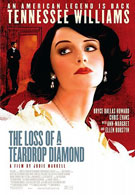After earning a number of Oscar nominations and a handful of wins working with director Elia Kazan on A Streetcar Named Desire (1951) and Baby Doll (1956), it made sense that Tennessee Williams would write a third screenplay for the two to bring to life. The problem is, there’s really nothing to bring to life in The Loss of a Teardrop Diamond. Perhaps someone realized the trouble back when Williams first completed the script, because Kazan opted to move onto other projects leaving The Loss of a Teardrop Diamond on a shelf collecting dust. Not even a super-powered Shop-Vac could clean this screenplay of its cobwebs. The Loss of a Teardrop Diamond is dated and further flawed by plain old poor filmmaking.
After her father’s selfish decision to demolish his own levee kills innocent workers, Fisher Willow (Bryce Dallas Howard) finds establishing a positive reputation amongst the traditional 1920 southern high society crowd nearly impossible. Fisher sees a series of very important parties as the perfect opportunity to step out of her father’s shadow and prove to everyone that she is a sincere young woman. Fisher’s got the look and the attitude to make an impression, but there’s one thing she’s missing, an escort. Well, an escort and a pair of $10,000 teardrop diamond earrings she convinces her Aunt Cornelia (Ann-Margret) to let her borrow. She should have just gone stag and diamondless, because it’s those two editions that drag the movie lower than if you wore earrings that were too heavy.
Fisher Willow is really a fascinating character. She wants to make a good impression but struts around showing off a nearly intolerable brash attitude. You want to shake her and beg her to act like a lady, but the glimmer of good intentions makes her actions somewhat commendable. Howard looks absolutely beautiful as the porcelain-skinned debutant, but her trouble maintaining the accent strips the character of authenticity. While this is a major issue, Howard is able to coast through most of the film keeping the audience somewhat connected with Fisher. Complete detachment occurs during the most dramatic scenes, which are rendered completely ineffective by poor performances, save for the two scenes shared by Fisher and Miss Addie (Ellen Burstyn).
The party that receives the most screen time is the one held by Fisher’s old friend Julie (Mamie Gummer). Miss Addie is Julie’s aunt, a travel-loving woman who’s bedridden by a series of strokes. She sees something in Fisher that suggests she would be willing to free her from this prison by giving her an overdose of her medication. The relationship is interestingly unique and, by far, the most moving segment of the film.
The most unmoving? Chris Evans as Jimmy. Literally. Evans’ performance is as stiff as they get. Even when in the midst of a heated argument, Evans’ facial expressions are stagnant. Howard drags him along for some of the film, but he’s got some fairly heavy-duty instances he’s forced to handle on his own that completely kill whatever flow the film’s established. Jimmy’s family used to be well off, but now he works at the store on Fisher’s father’s plantation, his father is a drunk and his mother is in a mental facility. When Fisher insists he accompany her to the parties, he halfheartedly agrees, but eventually sees something special about her. Just when their relationship is about to turn into something more than just a circumstantial arrangement, Fisher loses one of her teardrop diamond earrings and, out of anger, suggests Jimmy has stolen it.
Even if the acting were more convincing, this scene would still be far from it. None of the characters’ reactions are justified. Fisher’s accusation is out of leftfield and Jimmy practically stomps his feet and reacts like a child. This scene is particularly unforgiving for it sets into motion the definitive party scene where most of the action occurs. Actually, it doesn’t really set anything into ‘motion’ nor does any ‘action’ occur. There’s no better word to describe this part of the movie than boring.
There’s a few visually stimulating images, but none of which are capable of making The Loss of the Teardrop Diamond feel like anything more than a mediocre school play. There’s a finger pointing at just about everyone involved in this project. The acting is poor and actress-turned-director Jodie Markell’s inexperience completely tarnishes the piece. Even Williams himself is not out of the clear. The Loss of the Teardrop Diamond is not a proper screenplay. Perhaps it would have come across properly on stage, but as a movie, it’s uninteresting, flat and nearly unwatchable.
Your Daily Blend of Entertainment News
Staff Writer for CinemaBlend.


